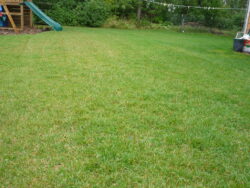Kentucky Bluegrass (Poa pratensis) is a popular turfgrass known for its lush, dense growth and vibrant green color.
It’s favored for lawns, sports fields, and parks due to its resilience and ability to recover from damage.
When considering wildlife interactions, particularly with deer, understanding whether Kentucky Bluegrass is a preferred food source is essential for managing landscapes and gardens effectively.
Will Deer Eat Kentucky Bluegrass?
Deer are adaptable feeders with a diet that varies by season, availability of food sources, and regional preferences.
Kentucky Bluegrass does fall within the range of grasses that deer may consume, especially when their preferred food sources are scarce.
Deer Dietary Preferences
- General Diet: Deer are herbivores that primarily feed on leaves, shoots, flowers, and fruits of a wide variety of plants. Their diet shifts seasonally to include the most readily available and nutritious food sources.
- Grass Consumption: While grasses are not the top choice for deer, especially when more preferred browse such as tender shoots, leaves, and agricultural crops are available, deer will eat grasses, including Kentucky Bluegrass, particularly in early spring when young, tender growth is emerging.
- Kentucky Bluegrass in Deer Diet: Kentucky Bluegrass can be part of a deer’s diet, but it’s typically not their first choice. In areas where Kentucky Bluegrass is prevalent, such as open fields, parks, and lawns, deer may graze on it, especially if other more preferred food sources are not available.
Factors Influencing Deer Grazing on Kentucky Bluegrass
- Seasonal Availability: During spring and early summer, when Kentucky Bluegrass is lush and green, it’s more likely to be consumed by deer.
- Food Scarcity: In periods of food scarcity, deer are more likely to broaden their diet to include a wider range of plants, including various grasses.
- Habitat and Range: In suburban and rural areas where natural habitats intersect with human-managed landscapes, deer may be more likely to graze on Kentucky Bluegrass lawns and fields.
Management Strategies
For property owners concerned about deer damage to Kentucky Bluegrass lawns or landscapes, several management strategies can be employed:
- Deer-Resistant Plantings: Incorporating deer-resistant plants around the perimeter of Kentucky Bluegrass areas can deter deer from entering and grazing.
- Physical Barriers: Fencing can effectively prevent deer from accessing areas planted with Kentucky Bluegrass.
- Repellents: Various commercial and homemade repellents can deter deer, though their effectiveness may vary and require regular application.
In Summary
- Deer may eat Kentucky Bluegrass, especially during early growth stages or when preferred food sources are scarce.
- Kentucky Bluegrass is not typically a primary food source for deer but can be consumed as part of their varied diet.
- Effective management and deterrent strategies can minimize deer grazing on Kentucky Bluegrass lawns and fields.
Sources
- Green Warriors: Provides a detailed description of Kentucky Bluegrass, including its growth habits and uses. Green Warriors – Kentucky Bluegrass
- UW NPS: Discusses the ecological impact and uses of Kentucky Bluegrass, highlighting its adaptability and interactions with wildlife. UW NPS – Kentucky Bluegrass
- Miche Pest Control: Offers insights into deer dietary habits, including their consumption of grasses and other vegetation. Miche Pest Control – What Do Deer Eat?



